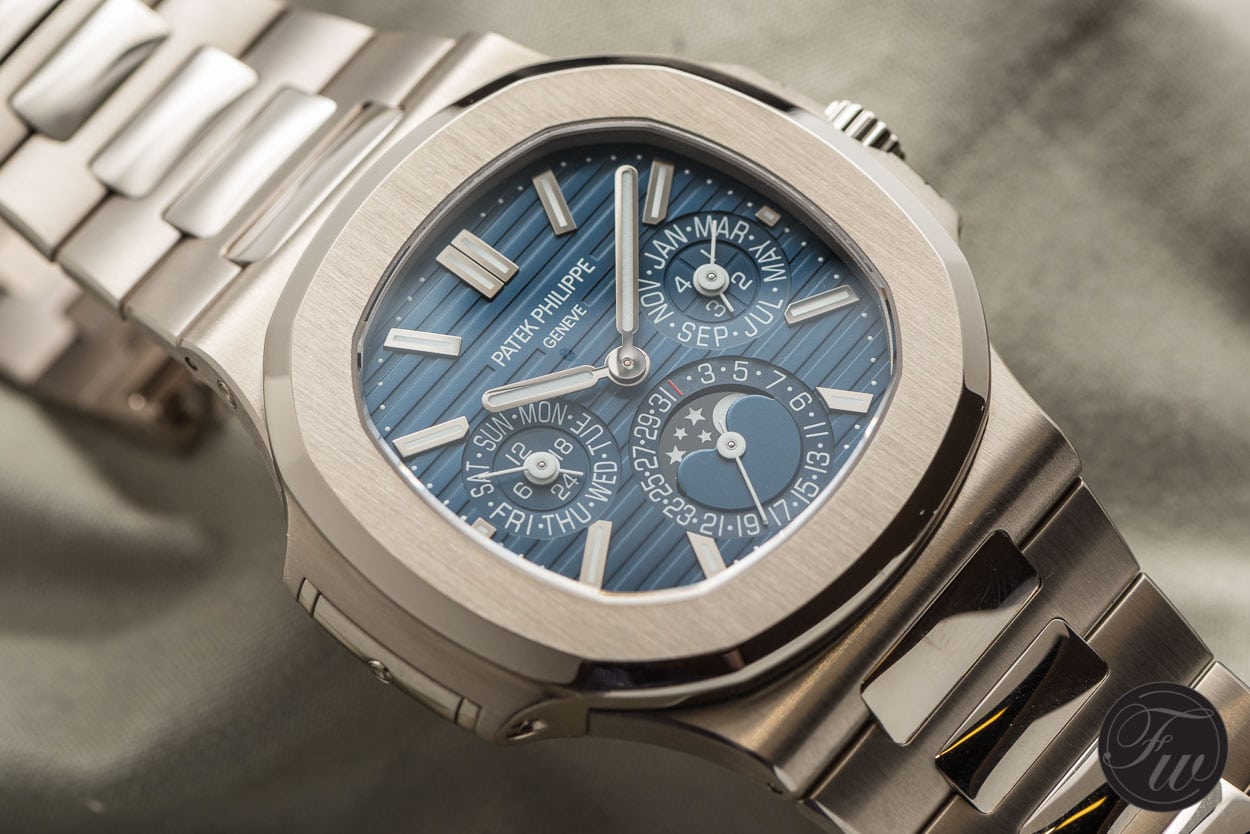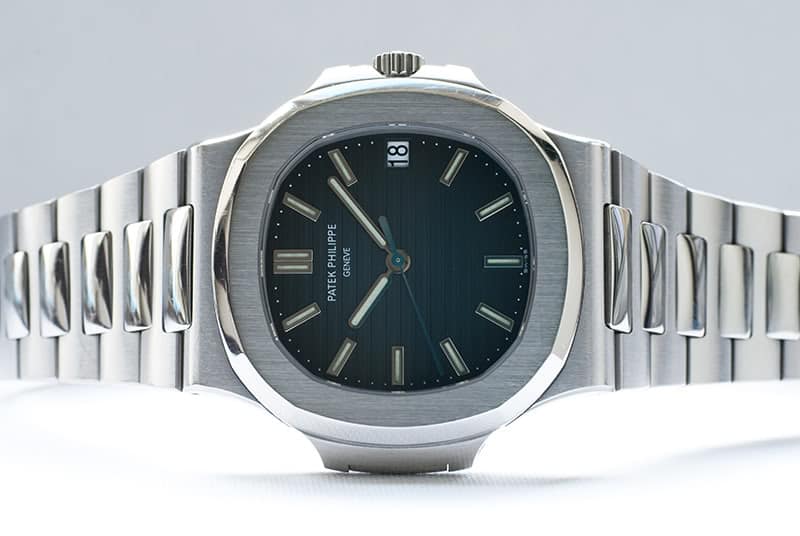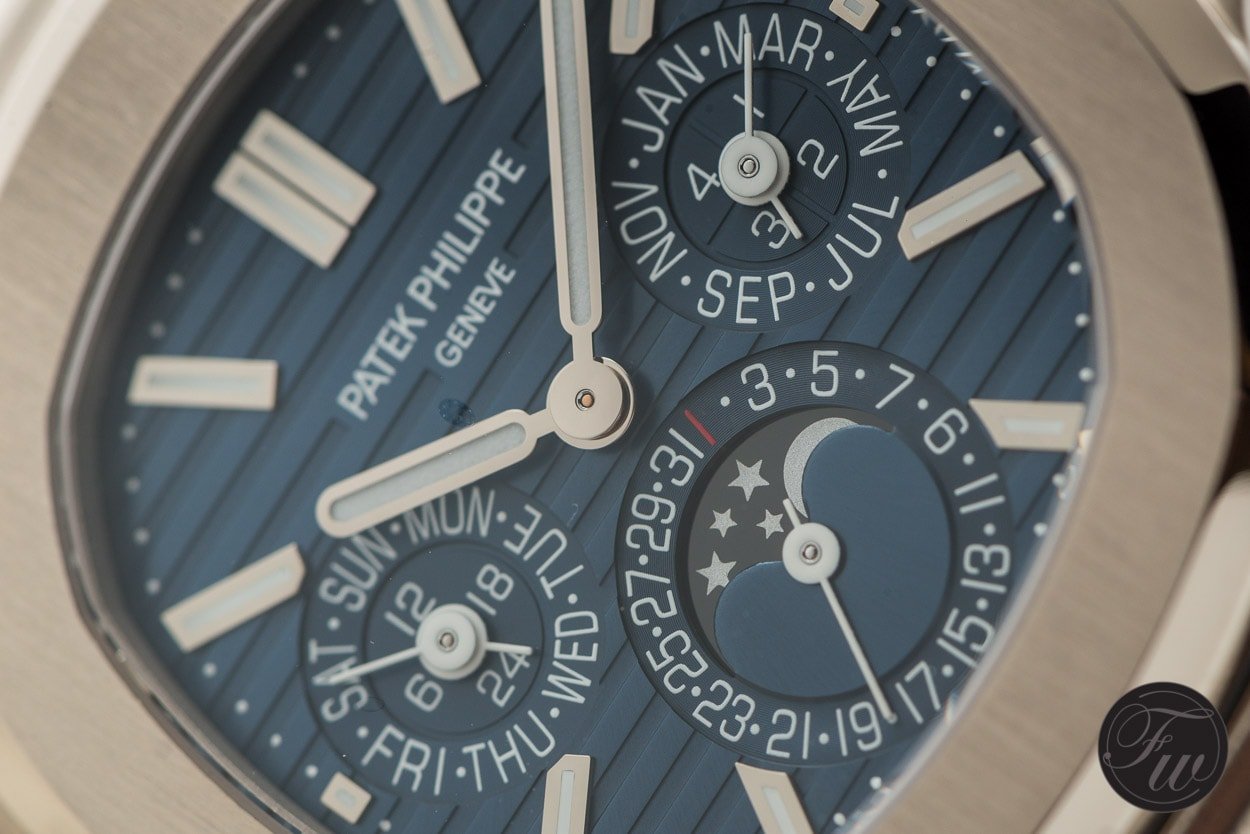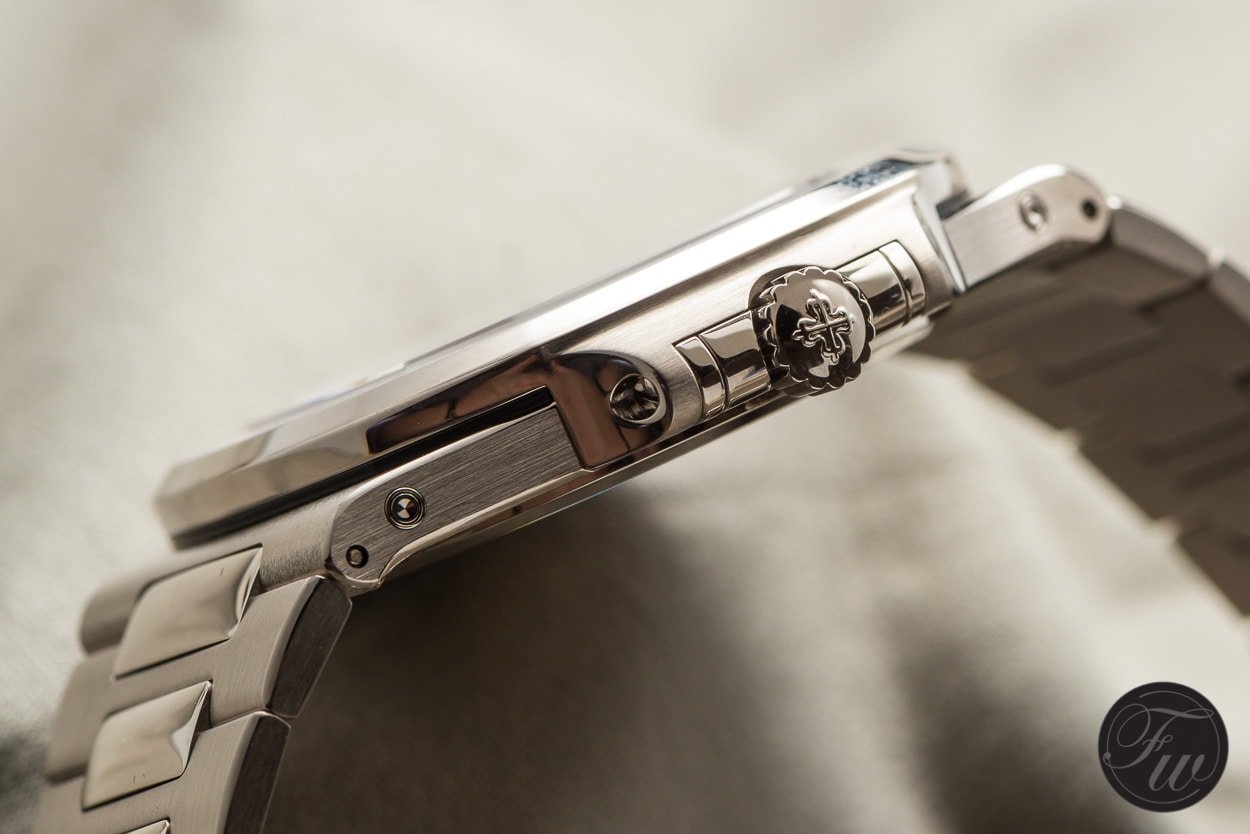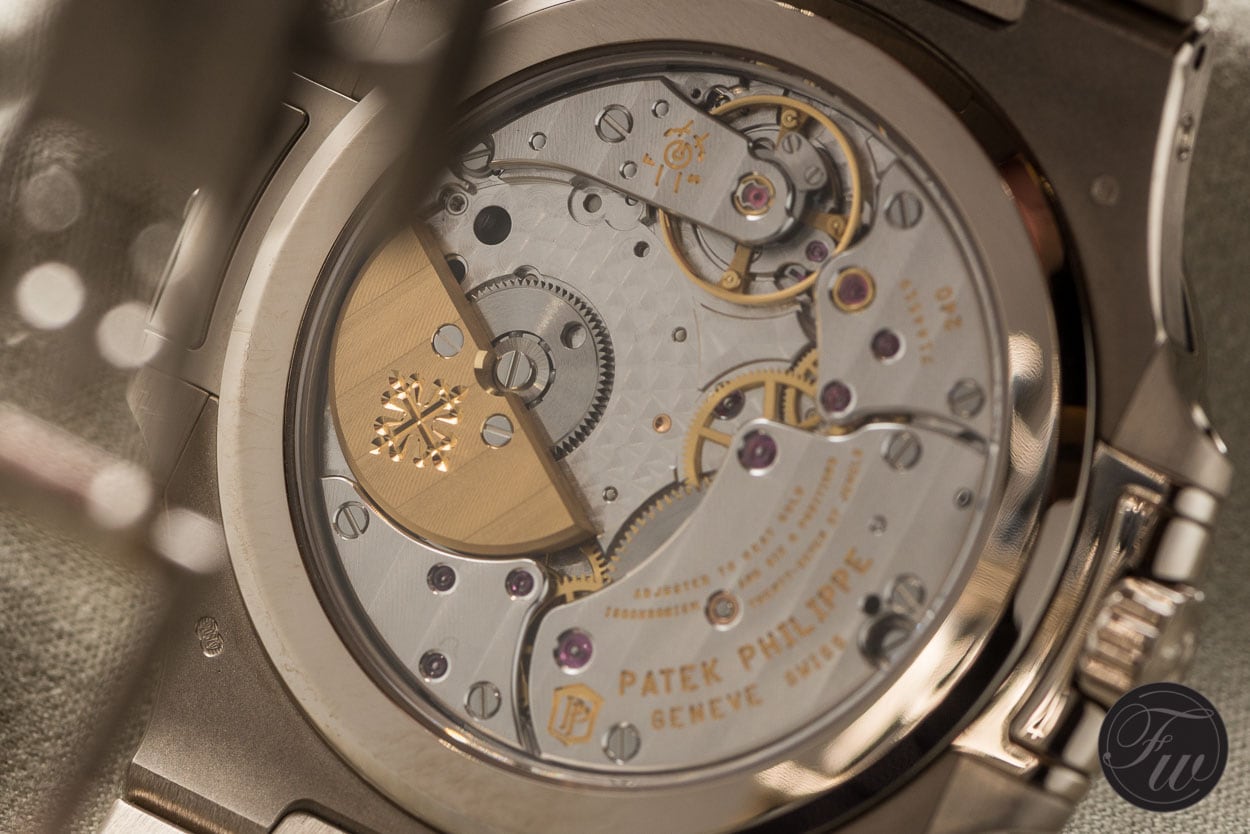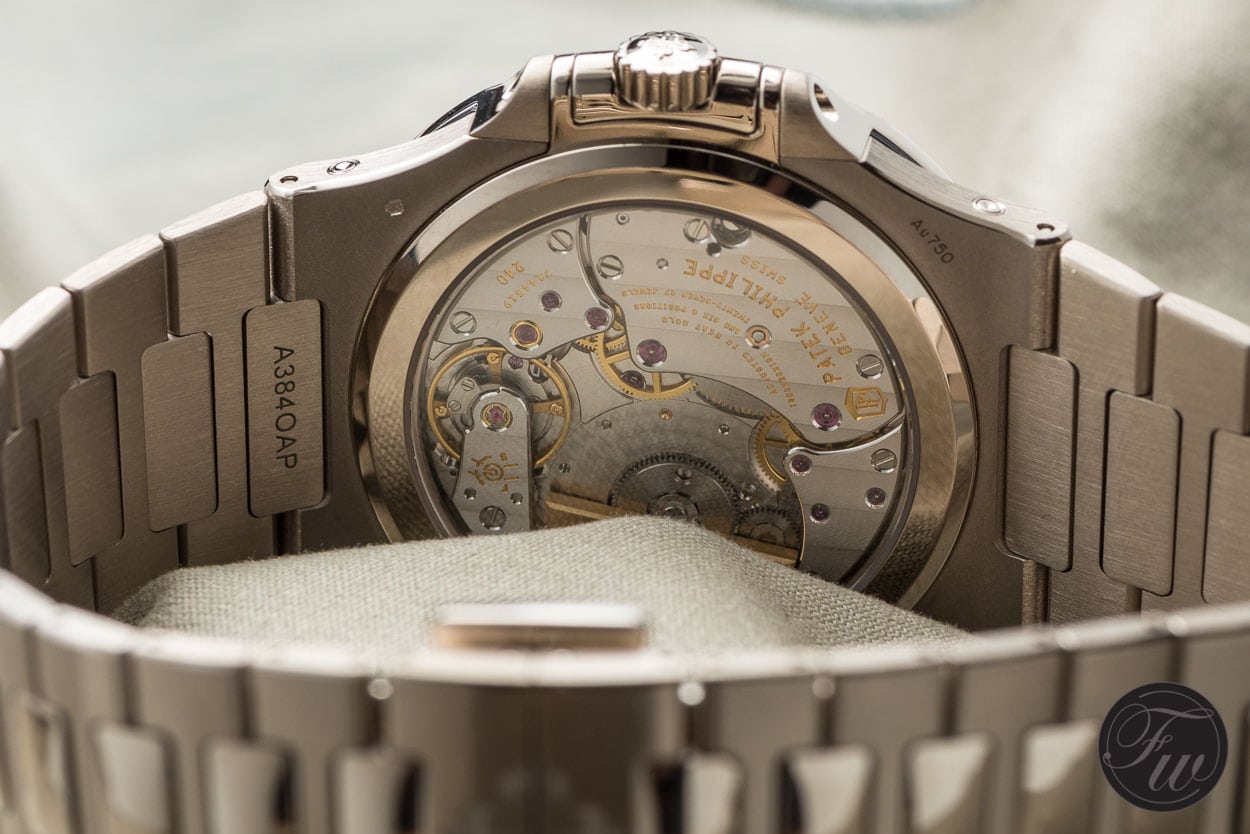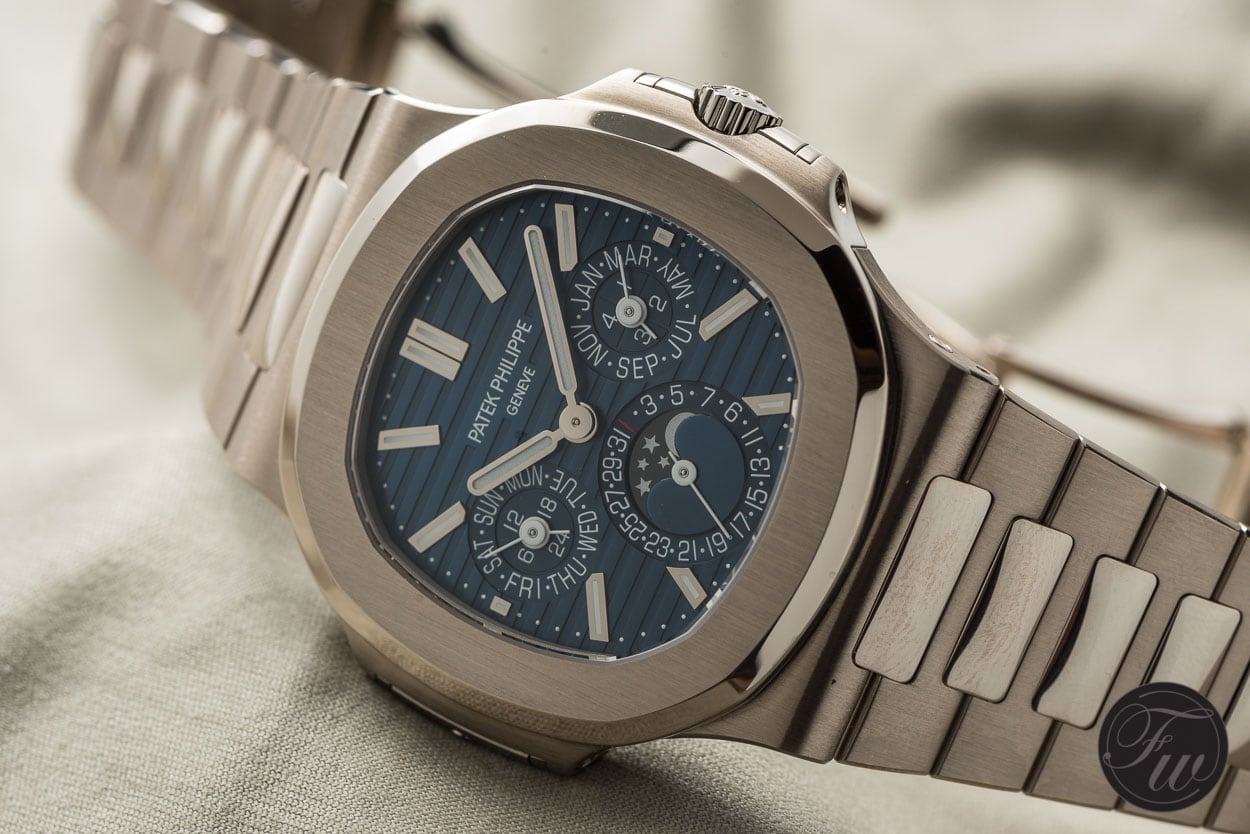Hands-On With The Patek Philippe Nautilus 5740/1G
A 7-year waiting list for the Patek Philippe Nautilus. You’ll already need to own a Patek Philippe already in order to order a Nautilus. A new Patek Philippe Nautilus is the perfect investment. Just a few of the discussions and statements we have read, heard and had ourselves about the Patek Philippe Nautilus in the past.
The Patek Philippe Nautilus collection consists of 33 different watches today, the newest model being this Nautilus 5740/1G, or the ‘Nautilus Perpetual Calendar’. The Nautilus 5740/1G is actually the first grand complication in the collection. While the ‘simple’ three-hand Nautilus 5711/1A is the most wanted reference, there is also a date & moon phase model (reference 5712), an annual calendar (reference 5726), a chronograph (reference 5980) and a chronograph & dual time model (reference 5990). And now a perpetual calendar complication has been added to the Nautilus family. What used to be considered as the enfant terrible of this Geneva manufacture, has now become one of the hottest watches in the world. Instead of creating limited editions of all sorts, Patek Philippe chooses to keep the production limited, while the demand is high. Very high. It is simply not available, see the first paragraph of this article.
While this new Patek Philippe 5740/1G has a retail price of CHF105,000.- Swiss Francs (or $119,070.- USD), it will probably still be tough to get. But those who do are hopefully by collectors who will actually wear the watch, instead of buying it for investment reasons only, but I guess the opposite is most likely the case.
Let’s put the constant flow of rumours, price increases, waiting lists for what they are for a moment, and have a look at the latest addition to the Nautilus collection.
Patek Philippe Nautilus 5740/1G
Here at Fratello, the opinions are a bit diverse on the Nautilus watch. While Michael Stockton is probably not into them at all, for example, I know that Gerard is a die-hard fan of the Nautilus. However, with Gerard purists approach to watches, he will always go for that vintage Nautilus 3700/1A reference. Myself, I am a fan of a lot of things that Gérald Genta designed, including the Royal Oak and Nautilus. And while I will always prefer the most basic Royal Oak (15202) over any of the other models they have in their collection, this doesn’t apply somehow to the Nautilus. Although I admire the 5711/1A (or 3700/1A for that matter), I would love to own one of the models (at some point in life) with an additional complication. Somehow it compensates a bit for the very reserved appeal of the rest of the watch.
The dial of the white gold 40mm Nautilus 5740/1G is everything but reserved. A lot is going on there, as you can see. Three subdials have been added in order to indicate the moon phases, day, date, month, leap year and whether it is day or night, using a 24-hour indicator. All this complex mechanical functionality is housed in a case that’s only 8.42mm in height. That’s thinner than a lot of watches out there, without any complication. If you’re not familiar with the perpetual calendar, it is an incredible complication that ensures correct display of the calendar until the year 2100. So the 1st day of every month will be displayed correctly, unlike an annual calendar, that needs to be corrected every 1st of March.
To be able to develop a watch that is so thin, a very thin – or ultra-thin – movement needs to be designed and used. This movement was already ‘in stock’ at the Patek Philippe manufacture, and has been used in two of my favourite dress watches: the reference 3940 and reference 5140 perpetual calendars. I am talking about calibre 240 Q. A self-winding movement that’s just 3.88mm in height, bearing all these complications. It has an off-centre micro-rotor, made of 22ct gold and ticks at 21,600vph. A beautifully designed and finished movement, by the skilled craftsman from Patek Philippe. The calibre 240 Q movement can be observed through the sapphire case back of the Nautilus 5740/1G. Did you know that for a long time, Patek Philippe refrained from having see-through case backs? They just felt the movement was something you should just rely on, only something for the watchmaker to see and work on. Since they changed this policy, everyone is able to enjoy the aesthetics of their hand-finished movements. Praised around the world for its beauty and reliability. The beautifully decorated and finished movement also carries the Patek Philippe Seal. It is a quality seal that was developed by Patek Philippe, that ensures that the watch has been made according to a strict set of standards. The watch, not only the movement. So this seal also applies to the bracelet, case, dial etc. It also covers a lifetime guarantee (of the watch) that it can be serviced and repaired, for all of their watches made since 1839. Interesting, as some other famous Geneva brand for example, only ensures they are able to repair their watches up to 25 years old and those are less complicated. Luxury watches are meant for a lifetime, in case of Patek also for the next generations, so this seal is actually quite an important message. The only weak spot about this seal is that it is according to Patek’s own standards and that they basically certify themselves. A bit like a company that has its own financial statement signed off by their own in-house CPA. Although I certainly believe Patek Philippe lives up to these standards, the seal would be even more powerful when an independent third party would certify them with a quality hallmark.
Anyway, the calibre 240 Q movement in this Nautilus 5740/1G is stunning and as long as you make sure it will receive its periodical service intervals, it will last a lifetime and probably much longer than that.
Operation of the movement is done by the crown and the small micro pushers that are as disguised as possible on both sides of the case. The case of the Patek Nautilus 5740/1G is finished in the same way as the regular Nautilus 5711/1A. Beautiful combinations of polished and satinized facets, that you will also find on the bracelet and clasp. The larger surfaces have the brushed finish while the slope and side of the bezel and the facets of the case and bracelet have a beautiful polished finish. The centre link of the comfortable integrated bracelet is also polished. This combination, that we also see on some of the other 1970s Genta designs is simply breathtaking. Changing the angle of your wrist will change the look of these watches, especially in low-light conditions.
Not only the perpetual calendar complication makes up for the price of CHF105,000 Swiss Francs, also the fact that this Nautilus 5740/1G is made of white gold helps. The /1G indicates the use of white gold, for those unfamiliar with the reference codes by Patek Philippe. Gold has also been used for the moon phases disc for example. This disc, made of sapphire, has two gold moons and a number of stars on there.
With the addition of the perpetual calendar to the Nautilus collection, Patek Philippe combined their iconic luxury sports watch with a superb complication. Although in my opinion they also did that already with the chronograph. The chronograph is an often underrated complication in terms of complexity. However, the aesthetics are quite different of course. Where the chronograph always adds some bulkiness due to the extra pushers for operating the movement, the perpetual calendar only needs a few very small correctors that can easily be hidden in the case band.
In my opinion, Patek Philippe did a marvellous job by keeping the aesthetics of the Nautilus as modest as possible. A thin case made of white gold, a beautiful blue dial with the typical Nautilus motif and only a dial that reveals the grand complication. The white gold has, of course, this soft glow that you won’t find on the stainless steel versions of the Nautilus. But only those who know will identify it as a white gold watch, and most probably because of the dial layout that shows there’s more going on than just three hands and a date aperture.
I’ve seen the vintage Nautilus 3700/1A approaching the €100.000 mark, and although I see the beauty and ‘collector’s passion’ for that reference, I would certainly spend my own money on this perpetual calendar for the sake of combining one of the most beautiful watch designs in the world with one of the most interesting complications in the world, both by Patek Philippe.
More information via the Patek Philippe website.

